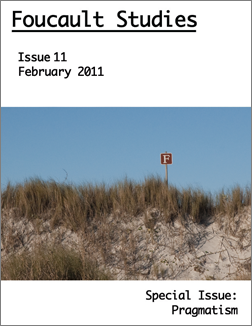Dewey and Foucault: What's the Problem?
DOI:
https://doi.org/10.22439/fs.v0i11.3202Abstract
This article explicates a valuable but undernoticed point of contact between John Dewey and Michel Foucault. Both agreed that thinking arose in the context of problems such that the work of thought for both proceeds by way of working through and working over problems. Both affirmed that thinking arose in problematic situations; that it was about clarifying those situations, and that ultimately it was directed towards achieving a degree of resolution of what was problematic in the situation. Both agreed that thinking—or inquiry—was not fundamentally about the representations of a situation; either those produced by a contemporary thinker or as an exercise directed at historical materials. Both agreed that a history of ideas as autonomous entities, distorted not only the process of thinking as a practice, but also the reasons for which it had been engaged in, often with a certain seriousness and urgency, the first place: that is to say, such approaches covered over the stakes. Both agreed that the stakes involved something experiential and entailed a form of logic (or in Foucault’s later vocabulary a mode of ‘veridiction’), in which the thinker could not help but be involved.Downloads
Published
2011-02-01
How to Cite
Rabinow, P. (2011). Dewey and Foucault: What’s the Problem?. Foucault Studies, (11), 11–19. https://doi.org/10.22439/fs.v0i11.3202
Issue
Section
Special Issue on Foucault and Pragmatism
License
Authors retain copyright to their work, but assign the right of the first publication to Foucault Studies. The work is subject to a CC BY-NC-ND 4.0 license, but despite these restrictions, authors can take for granted that Foucault Studies will permit articles published in Foucault Studies to be translated or reprinted in another format such as a book providing a full reference is made to Foucault Studies as the original place of publication.



